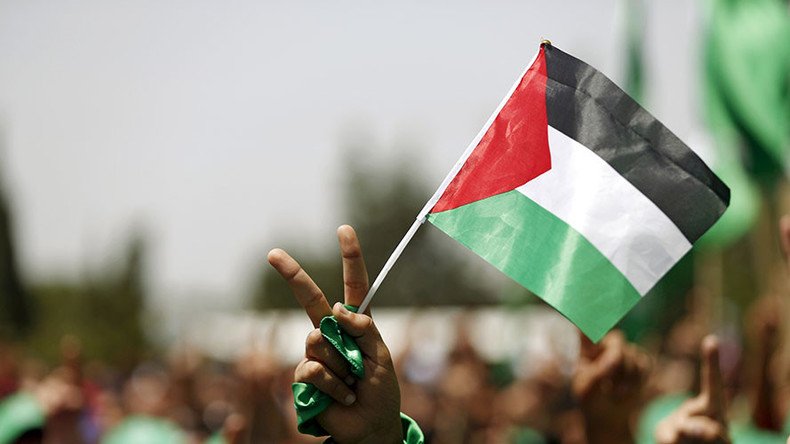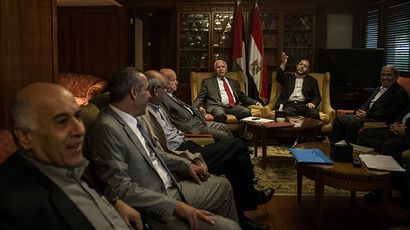Hamas ready for talks with Fatah to dissolve Gaza government & hold elections – statement

Hamas, which governs Gaza, says it is ready to begin talks with the Abbas administration to dissolve its administrative committee and hold an election as part of a deal brokered by Egypt. A Fatah official called the statement “positive and promising.”
In a statement posted on its website, Hamas has invited rival Fatah government for talks “in response to the generous efforts of Egypt… to achieve Palestinian reconciliation and end the division.”
As a step aimed at achieving national unity, the group, considered terrorist by Israel and some other states, has “invited the reconciliation government to come to the Gaza Strip to exercise its functions and carry out its duties,” the statement says.
بيان صحفي صادر عن حركة حماسhttps://t.co/JcngttTQ8opic.twitter.com/axwmg4ZwoI
— حركة حماس (@hamasinfo) 17 сентября 2017 г.
Hamas also expressed a readiness to restart dialogue with the Palestinian Authority without preconditions to form a unity government and fully implement the 2011 Cairo Agreement.
The statement was greeted as a "positive" development by the deputy head of the ruling Fatah movement, Mahmoud Al-Alul.
"The news that Hamas is dissolving the so-called administrative committee in the Gaza Strip is positive and promising," he told the Voice of Palestine radio station.
On Monday, Hamas announced it wanted to “hold meetings with Fatah in Cairo immediately” to achieve a reconciliation agreement, the Jerusalem Post noted in their report. On Wednesday, Fatah said Hamas would have to first announce the dissolution of its governing body in the Gaza Strip before any talks could commence, Fatah Central Committee member Azzam al-Ahmad told official PA radio.
Hamas and Fatah delegations have been in Cairo since Friday to negotiate an agreement proposed by the militant Palestinian faction which has controlled Gaza for a decade.
Palestine’s civil discord started in 2007 when Hamas seized power in Gaza while the West Bank territories fell under Fatah’s control. Since then, all attempts to reconcile the two groups and form a Palestinian power-sharing government have stalled.
Hamas and Fatah had previously signed a reconciliation deal in Cairo in 2011. The agreement was meant to have paved the way for legislative and presidential elections, but it stalled because of disagreements over who the prime minister would be. In February 2012, the sides signed the Doha agreement where they agreed on a joint political platform and on a truce with Israel. That process also fizzled out, this time over the issue of a joint elections scheme.
In May 2012, Hamas and Fatah signed the Cairo accord reaffirming their commitment to a new unity government and agreed to begin work on holding elections. That, however, did not take hold either, and the process practically hit a two-year roadblock.
In April 2014, the two factions signed yet another reconciliation agreement, vowing to see a unity government formed within five weeks. They also promised to hold presidential and parliamentary elections within 6 months.
However, the government of Benjamin Netanyahu spoke out against the Palestinian unity government sworn in by President Abbas under the leadership of Rami Hamdallah. Israel swiftly suspended peace talks with the Palestinians, refusing to deal with Hamas which Tel Aviv considers a terrorist organization that aims only to destroy the State of Israel. Netanyahu also slapped new sanctions on the Palestinians.
The work of the Palestinian unity government was, as a result, severely impeded, and forced Hamas and Fatah to meet in Cairo in September 2014, where they agreed on the tasks and responsibilities of any new government. Elections initially planned for the end of 2014 have been put off indefinitely. Meanwhile, peace negotiations between Israel and the Palestinian Authority collapsed in April 2014.
Russia has been trying to play an active role in efforts to reconcile the Palestinian factions, emphasizing that Palestinian unity is necessary in order to have meaningful discussions with Israel on a two-state solution.
“We are trying to reconcile those who live and work in the Gaza Strip with those in the West Bank and Mahmoud Abbas’ administration,” Russian Foreign Minister Sergey Lavrov noted earlier this month during a three-day visit to the Middle East.
“We are in contact with Hamas and Fatah to get them to resume implementation of the agreements reached not long ago, to unite under the single roof of the Ramallah administration and to hold general presidential and parliamentary elections.”













